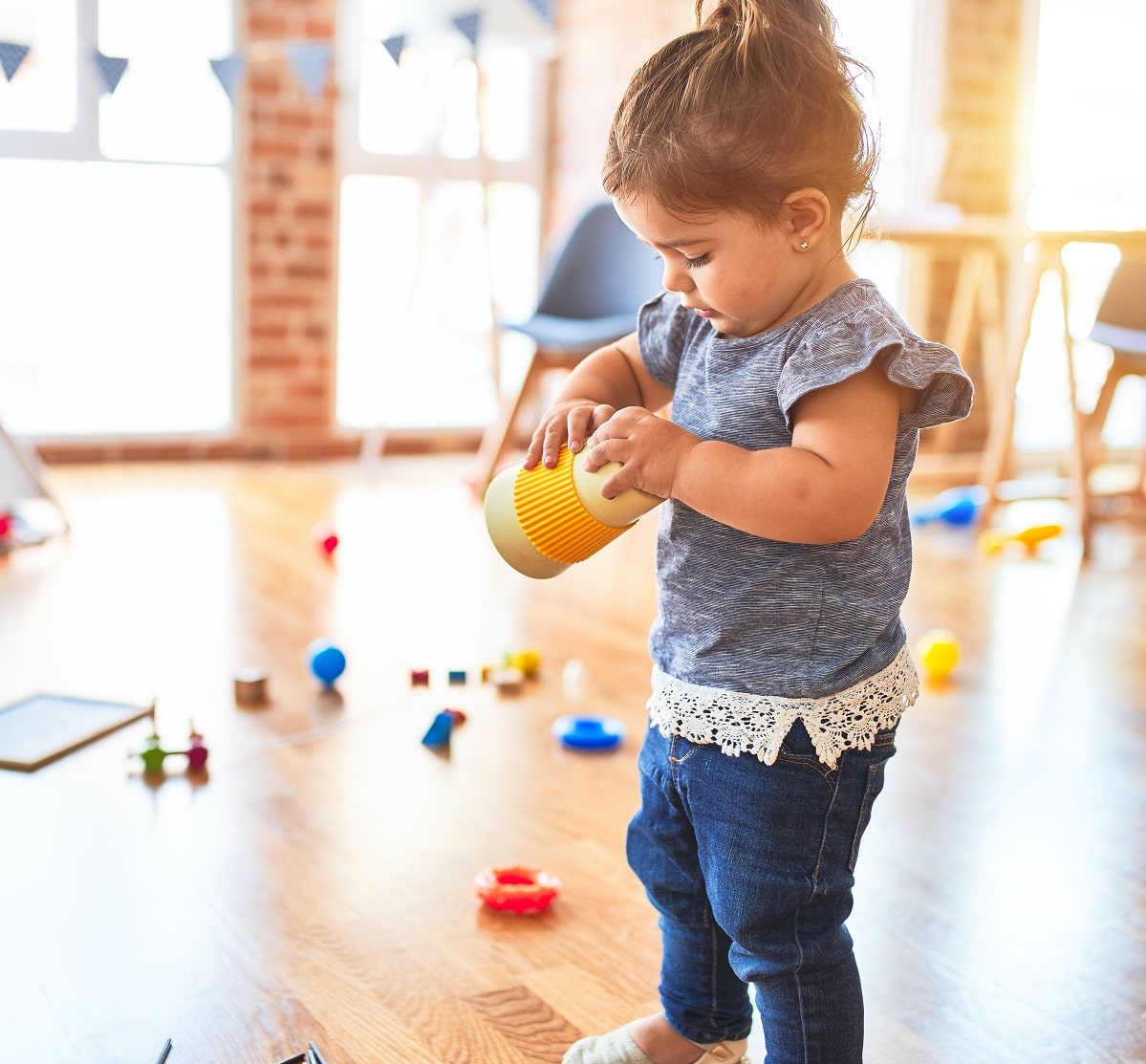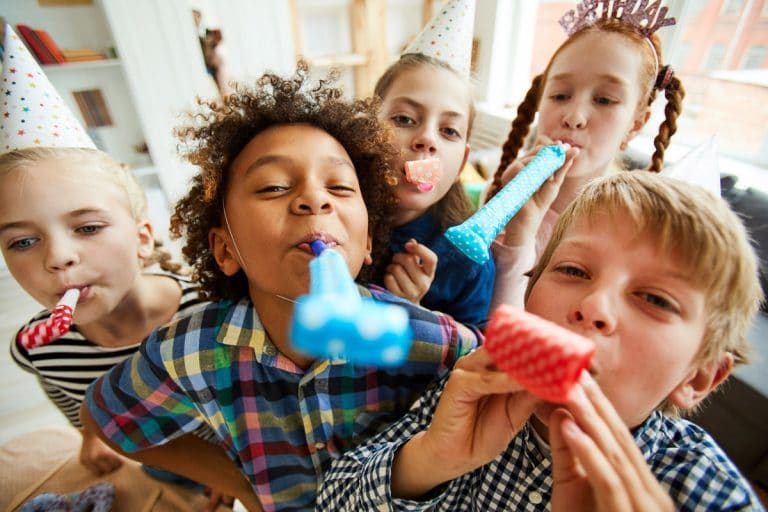Preschool and Kindergarten are important milestones in a child’s education. Parents often wonder what minimum age are in preschool and kindergarten? 1) Preschool: It is childhood education before kindergarten starts. Kids start preschool typically between 3-5 years old. 2) Kindergarten: The first school year of formal schooling after preschool and pre-K. It is usually for children around 5 years old or 6 years old.
Preschool and kindergarten readiness are both a part of the early learning experience. Preschoolers learn through play and exploration. Children starting preschool spend most of their day exploring outside or playing with toys indoors. The environment there helps foster mental, social/emotional, and physical development in children. When entering kindergarten, the focus goes upon reading, writing, maths, and gross motor skills. They have more structured lessons. It teaches the child about subjects like science and history as well as how to work collaboratively with classmates.
Kindergarten and Preschool setting are terms for a segment of the school curriculum. In most cases, preschool age is 3-4 years before transitional kindergarten. So that children can get comfortable with their surroundings and start to develop social and fine motor skills. Preschools offer subjects like art, music, writing, science experiments, maths games, and more!
Kindergarten students learn how to decode words using the alphabet system. The goal of kindergarten is to prepare them for first grade. It teaches them basic reading skills (reading aloud) as well as letter sounds (phonics). They might even explore other topics like shapes or colors. These concepts will help them in future grades.
What is a preschool?
Preschool is an educative institution for children. Kids start preschool in age range 3-5. It usually lasts half of the day (from 8:00 am to 12:00 pm). These are mainly designed to help children learn fundamentals and prepare them for kindergarten. There are many types of preschools. Like public or private, and secular or religious. Before-school care programs (or nursery schools), and family home providers (in which many parents provide care at their own homes), are there as well.
Preschoolers learn through play with the help of teachers (early childhood educators). Those teachers create engaging activities that promote development in areas like literacy, math, science, social studies, and art. The National Association for the Education of Young Children recommends that all preschoolers be given daily opportunities to engage in play. Play is the primary means of learning for children this age.
Preschoolers learn through basic instructions and hands-on activities. But they also need time to socialize, experiment with new materials, and challenge themselves. They are constantly testing boundaries (physically and emotionally) as they seek independence from their parents. Reading aloud to preschoolers is an important part of the preschool experience. Along with books, children will also learn to share and take turns listening to stories with their peers or preschool teacher. It is a great way to prepare them for learning how to read in kindergarten.
What is a kindergarten?
“Kindergarten is an educational institution for children in early childhood. It often takes place in a school or childcare facility and can be part of the public education system.” – Wikipedia
A Kindergarten is a preschool that goes all the way to Grade 1, but it has its unique curriculum. The teachers will go over things like letters, numbers, shapes, colors, and other subjects that are important for kids this age. Kids will also get their first taste of reading during their time at kindergarten!
It is a place where children go to learn and play. It’s also called pre-school or nursery school. Kindergarten usually starts when your child turns five years old. At the kindergarten, kids will learn about things like colors, shapes, numbers, letters, and more through fun activities like crafts and games! The best part of kindergartens is that they teach your child how to get along with other people their age while having fun too!
Kindergarten is an important step in preparing for elementary school. It helps them become socialized around others their age. They’ll make friends at this point which will help them feel more comfortable when starting elementary school later on down the road.
What is the difference between preschool and kindergarten?
The difference between preschool and kindergarten is that preschool provides a child with an introduction to the preschool environment through various activities. Like circle time, art projects, storytime, music class, and field trips. In contrast, kindergarten provides children with more academic achievement content instruction in reading and math. This may be done through games or other hands-on activities.
Preschool and kindergarten are both educational institutions that are geared towards children who are 3 to 5 years old. Preschool is designed for kids under the age of 4 or 5. The curriculum is focusing less on academic growth. But has an emphasis on socialization, art, music, physical education, and storytime.
Kindergarten is geared more towards academics. Here students learn reading, writing, math, and science skills in a structured environment. Most programs at this phase remain 8 hours long per day. Students will also have homework assignments every night so they can practice what they learned during the day at school.
Preschoolers may need to take some extra time adjusting to the increased workload of kindergarten including homework. This means parents should be prepared for their child’s behavior to change after starting this new phase.
Preschool usually lasts for 3 hours a day with an adult to child ratio of 1:8 or 1:10 depending on where you live. This program focuses on pre-reading skills. It includes letter recognition, sound recognition, and word identification. Kindergarten typically lasts for 7 hours a day with an adult to child ratio of 1:15 or less. It depends on your individual school district’s requirements. In kindergarten children focus more heavily on reading comprehension as well as math concepts such as counting money and telling time.
The main difference between preschool and kindergarten is that in preschool child develops pre-reading skills. While in kindergarten they are taught to read. It is important for preschools to implement activities that will prepare children for future schooling as well as provide age-appropriate experiences.
Kindergartens and Preschools: Which should I choose?
When choosing a preschool or kindergarten there are many factors to take into consideration. Such as location, cost, quality of teachers, programs offered, etc. At the end of the day, it is up to personal choice as each program has its pros and cons. Some parents choose kindergarten. They believe their child is more mature for their age. While others may prefer preschool because there are fewer hours per day which means less time away from home.
Parents should base their decision on their child’s individual needs. If they are ahead in their reading skills then kindergarten would be the best option. But if they are behind in reading skills then preschool may need to be considered. No matter what the child’s age range, it is important for parents to do their research before choosing the right educational institution for them.
Benefits of attending pre-kindergarten programs
If you are a parent of young children, it is important to be aware that there are benefits to attending pre-kindergarten programs. Research has shown that these programs can help kids develop social skills and learn how to work together in groups. Not only does this benefit the child’s future development, but also their academic career. It is important for parents to research what type of education their children will need as they grow up because experiencing these types of early childhood education opportunities can make all the difference!
Studies show that students attending these programs have higher test scores, increased self-confidence, and improved social skills. These benefits can be seen even when the student transfers to a different school after attending pre-kindergarten. It is important for parents to consider enrolling their children in pre-K so they will get the best start possible!
A study by the University of Chicago’s Child and Family Research Lab found that children who attended an early childhood education program had better literacy skills at age 5 than those who did not attend. They also found that these children were less likely to need special education services!
A recent report from Boston College’s Center on Wealth and Philanthropy showed that even if parents don’t want their children to go into higher education, they should still enroll them in a pre-k program. It will lower the chances of them becoming part of the low-income population later in life. Studies have shown that students with access to high-quality preschool education are more likely to graduate high school, attend college and ultimately make more money over their lifetime.
What to consider when visiting a preschool program?
Parents often have many questions when visiting a preschool program. One of the most common questions parents have is what to expect when visiting a preschool program. First, there are three different types of preschool programs: public, private, and charter. The type of school you choose should be based on your child’s needs or preferences.
What is taught in each type? Public schools teach reading, writing, math, and science for free but do not offer transportation to get there. So if that is something you need then it might be worth considering other options such as private schools or charter schools. They may provide buses for children who live within their area boundaries.
Private schools and charter schools’ charges vary by the state school districts. You can also homeschool your child. However, this option does not have the socialization benefits children get when they attend preschool.
You should also expect that the school will be clean and well-organized when you visit. When visiting schools to find out what type of education is offered consider asking questions. Like: How many teachers are there in the preschool program? What is their education level? How do they teach to a small group in a classroom setting? Programs that have been approved by the state should be able to answer all of these questions.
How much does it cost to send your child to preschool or kindergarten?
In the United States, preschool and kindergarten are not mandatory. That means that there is no federal law requiring parents to send their children to these schools. In some states, however, it’s required as a condition for getting a child’s birth certificate or social security card. Some parents may also feel that sending their child to preschool or kindergarten will help them be ready for school when they reach first grade.
The cost of sending your child to one of these two schools varies depending on where you live and what type of school you choose (i.e., private vs public). The National Association of Child Care Resource & Referral Agencies signifies that the average cost of preschool in the US ranges from $4,460 to $13,158 per year. But this can vary from state to state due to different tax rates and other factors such as the school’s location. As far as what to expect when sending your child for preschool, they usually do more hands-on learning with bigger groups of students. Kindergarten classes are typically a little bit smaller. They often engage in more one-on-one activities to get kids ready for first grade.
Conclusion
Preschool and kindergarten are important for kids, but it’s even more important for parents. These years are the most crucial time in a child’s life because they set them up with foundations that will last their whole lives. Parents who want to give their young children the best chance of success should take advantage of early childhood education opportunities. Like preschool or kindergarten programs near them!











